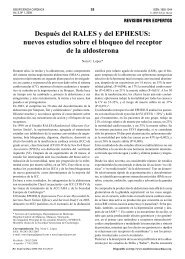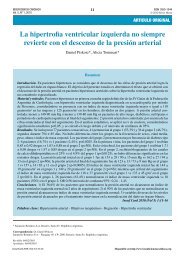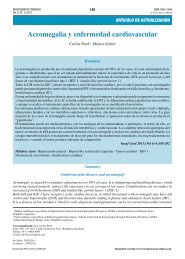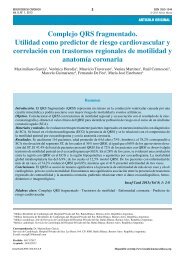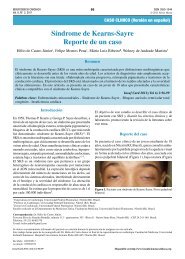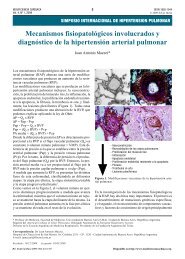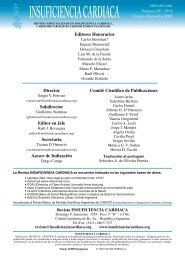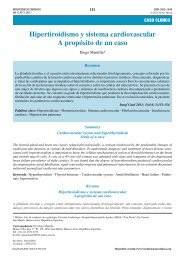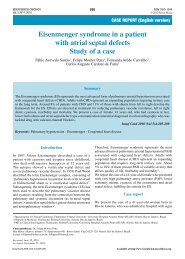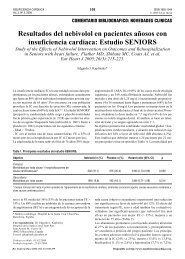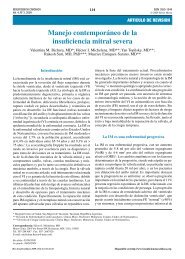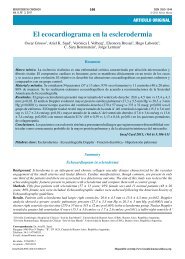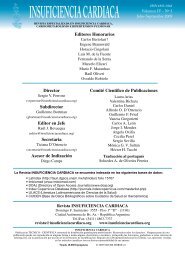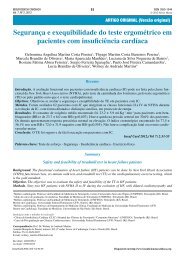Hipertiroidismo y sistema cardiovascular Bases fisiopatológicas y su ...
Hipertiroidismo y sistema cardiovascular Bases fisiopatológicas y su ...
Hipertiroidismo y sistema cardiovascular Bases fisiopatológicas y su ...
Create successful ePaper yourself
Turn your PDF publications into a flip-book with our unique Google optimized e-Paper software.
INSUFICIENCIA CARDIACA<br />
Vol. 5, Nº 4, 2010<br />
158 D Mantilla y col.<br />
<strong>Hipertiroidismo</strong> y <strong>sistema</strong> <strong>cardiovascular</strong><br />
Summary<br />
Cardiovascular system and hyperthyroidism<br />
Pathophysiological bases and its clinical manifestation<br />
The thyroid gland and the heart are closely related physiologically, this concept is reinforced by the predictable<br />
change in <strong>cardiovascular</strong> function in various thyroid disorders. To understand, diagnose and treat heart diseases that<br />
accompany hyperthyroidism is important to understand the cellular mechanisms of action of thyroid hormones (TH)<br />
on the heart and smooth muscle cells.<br />
The aim of this review is to reinforce the mechanisms of action of TH on the heart and peripheral vascular system,<br />
anatomic and structural changes that occur at myocardial level, interaction with the sympathetic nervous system,<br />
impaired electrical activity, hemodynamic changes on myocardial contractility and ventricular relaxation.<br />
The clinical manifestations of hyperthyroidism can lead to symptoms <strong>su</strong>ch as palpitations initial advance to a state<br />
of greater complexity <strong>su</strong>ch as heart failure (HF), an entity of high morbidity and mortality, could be expressed with<br />
rhythm disturbances, damage and impaired ventricular function valve, which left to their natural evolution may lead<br />
to death of the patient, giving relevance to the early recognition by professionals of the hormonal etiology of HF and/<br />
or the cause of his decompensation. This diagnosis allows early treatment and effective as euthyroid states lead to the<br />
normalization of <strong>cardiovascular</strong> disease in most patients.<br />
Keywords: Hyperthyroidism - Thyroid hormone - Cardiovascular system - Atrial fibrillation - Heart failure - Myocardial<br />
damage - Pulmonary hypertension<br />
Re<strong>su</strong>mo<br />
Hipertireoidismo e <strong>sistema</strong> <strong>cardiovascular</strong><br />
<strong>Bases</strong> fisiopatológicas e <strong>su</strong>a manifestação clínica<br />
A glândula tireóide e coração estão intimamente relacionados fisiologicamente, um conceito reforçado pela previsíveis<br />
alterações da função <strong>cardiovascular</strong> em várias doenças da tireóide. Para entender, diagnosticar e tratar das doenças<br />
do coração, que acompanham o hipertireoidismo, é importante compreender os mecanismos celulares de ação dos<br />
hormônios tireóideos (HT) no coração e células musculares lisas.<br />
O objetivo desta revisão é o de reforçar os mecanismos de ação dos HT sobre o coração e <strong>sistema</strong> vascular periférica,<br />
anatômico e variações estruturais que ocorrem a nível do miocárdio, a interação com o <strong>sistema</strong> nervoso simpático,<br />
alteração da atividade elétrica alterações hemodinâmicas na contratilidade miocárdica e relaxamento do miocárdio<br />
ventricular. As manifestações clínicas do hipertireoidismo podem levar a sintomas como palpitações adiantamento<br />
inicial para um estado de maior complexidade, tais como in<strong>su</strong>ficiência cardíaca (IC), uma entidade de alta morbidade<br />
e mortalidade, pode ser expressa com distúrbios do ritmo, disfunção ventricular e envolvimento valvular, que deixou<br />
a <strong>su</strong>a evolução natural pode levar à morte do paciente, dando relevância para o reconhecimento precoce pelos profissionais<br />
da etiologia hormonal de IC e/ou a causa de <strong>su</strong>a descompensação. Este diagnóstico permite o tratamento<br />
precoce e eficaz como os estados de eutireoidismo conduzir à normalização da doença <strong>cardiovascular</strong> na maioria<br />
dos pacientes.<br />
Palavras-chave: Hipertireoidismo - Hormônio da tireóide - Sistema <strong>cardiovascular</strong> - Fibrilação atrial - In<strong>su</strong>ficiência<br />
cardíaca - Lesão miocárdica - Hipertensão pulmonar<br />
Introducción<br />
Desde hace más de 200 años, se reconoce la relación<br />
existente entre la hormona tiroidea (HT) y el <strong>sistema</strong><br />
<strong>cardiovascular</strong> (CV). La glándula tiroides y el corazón<br />
están estrechamente relacionados desde el punto de vista<br />
embriológico. Esta relación fisiológica se ve reforzada<br />
por los predecibles cambios de la función <strong>cardiovascular</strong><br />
en los distintos trastornos tiroideos. De hecho, las<br />
manifestaciones <strong>cardiovascular</strong>es están entre las más<br />
frecuentes y típicas presentaciones del hipertiroidismo 1 .<br />
Para entender, diagnosticar y tratar las cardiopatías que<br />
acompañan al hipertiroidismo, es importante conocer bien<br />
los mecanismos celulares de la acción de las hormonas<br />
tiroideas sobre el corazón y sobre las células del músculo<br />
liso 2 . El hipertiroidismo no solamente puede agravar una<br />
enfermedad cardíaca preexistente, sino que también puede<br />
conducir a una enfermedad cardíaca.<br />
Son los objetivos de esta revisión: 1) profundizar en el<br />
conocimiento de los mecanismos de acción de la HT sobre



